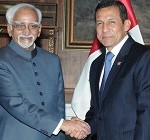Indian Vice President visits Peru and Cuba
Indian Vice President Hamid Ansari’s visit to Peru, from October 26-28, is noteworthy. Ansari signed four agreements, inaugurated the Indian Chamber of Commerce and the Festival of India in Lima, and discussed the signing of an India-Peru Free Trade Agreement. In contrast, his subsequent visit to Cuba on October 29 had no substance except for paying homage to the revolutionary leader Fidel Castro, and talking nostalgically about the past. However, it is encouraging to see the serious opening up of Cuba by Raul Castro who seems to be incrementally committed to reforms.
It would have served New Delhi better if another country such as Guatemala or Bolivia, instead of Cuba, was chosen for the second leg of the visit, since many countries in Latin America have not seen any high-level visits from India.
India’s External Affairs Minister visits Brazil
Indian External Affairs Minister Salman Khurshid’s visit to Brasilia from October 14-15 as co-chair of the Joint Commission meeting to review bilateral ties saw a 92-point Joint statement, but added substance to only a few aspects of the bilateral.
One is the expanding cooperation and the expected signing of a Memorandum of Understanding between Brazil’s National Health Surveillance Agency (ANVISA) and India’s Central Drugs Standard Control Organization (CDSO) – the pharmaceutical regulatory authorities of the two countries. This may help ease pharmaceuticals import restrictions that ANVISA has imposed on India. The second is an increase in educational collaboration with a new Brazilian Chair at the Jawaharlal Nehru University, and a Centre for Indian Studies in the State University of Rio de Janeiro. Third, Brazil is revising its immigration rules to make work visas easier to obtain, which will help Indian companies in Brazil, especially those in the IT sector. Although there was talk of widening of the India-Mercosur Preferential Trade Agreement, there are still no deadlines to conclude negotiations that have been going on for five years now.
Yoga for prisoners in Mexico
The Parinaama Foundation, based in Mexico, holds yoga classes for prisoners in Mexican jails, many of whom have shown positive changes in their mind and body after practicing yoga. Some of them have even become yoga instructors after coming out of the jail.
The Foundation started its work with the prisoners in 2003, and has taught yoga to about 5000 prisoners so far. Since drugs are the main cause for crimes in Mexico, the Foundation runs a drug prevention program as well. Some Mexican jails, that do not have tie up with Parinaama Foundation, conduct their own yoga sessions for the prisoners – with inmates working as yoga teachers. Prison wardens have reported a reduction in violence, aggression and more self-control among inmates who have undergone yoga training. The success of the program in Mexico has encouraged the Foundation to extend their work to the prisons in other countries such as Argentina and Costa Rica as well.
Suzlon gets a major contract in Uruguay
Suzlon landed a contract for Engineering, Procurement and Construction for the 65 megawatt (MW) wind energy project in Uruguay. The project, scheduled for completion in September 2014, is their first contract outside Brazil, in Latin America. In Brazil, Suzlon has already set up a 225MW wind energy project in the north-east, with projects of 218MW in the Ceara and Rio Grande de Norte provinces. In Brazil, they have also established a plant produce 2MW turbines with an annual capacity of 400MW. As a result, Brazil is the third biggest market for Suzlon, after India and the United States.
Ambassador Viswanathan is Distinguished Fellow, Latin America Studies, Gateway House. He is the former Indian Ambassador to Argentina, Uruguay, Paraguay and Venezuela, and Consul General in Sao Paulo.
This blog was exclusively written for Gateway House: Indian Council on Global Relations. You can read more exclusive content here.
For interview requests with the author, or for permission to republish, please contact outreach@gatewayhouse.in.
© Copyright 2013 Gateway House: Indian Council on Global Relations. All rights reserved. Any unauthorized copying or reproduction is strictly prohibited.


